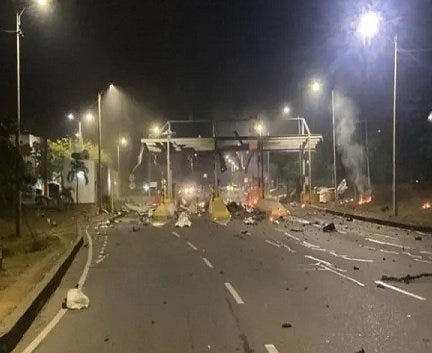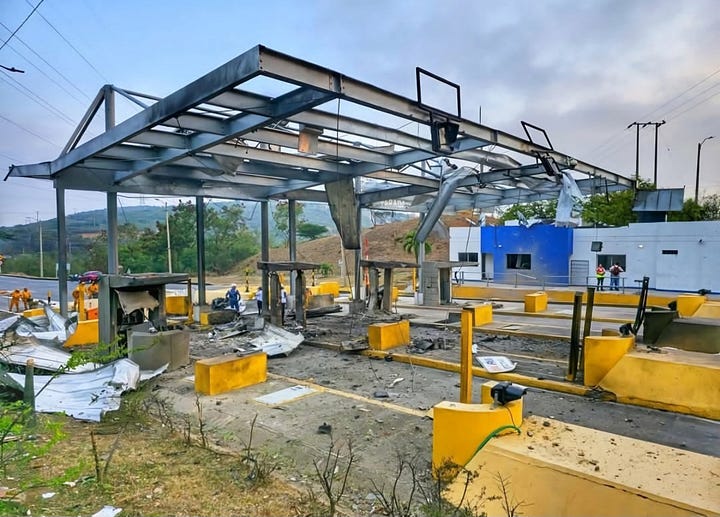“Total Peace” in Colombia in danger of total collapse
ELN mounting major offensives in three regions of the country against other armed groups and police alike
Colombia’s largest remaining rebel group, the National Liberation Army (ELN), is in the midst of a major offensive in at least 3 regions of the country and carried out a series of bombings on police stations and infrastructure across the Venezuelan-Colombian borderlands.
ELN began attacking the FARC dissident group Frente 33 in Catatumbo, on the Venezuelan border, in late December. The resulting violence displaced more than 30,000 residents, more than half of whom fled to Cucuta, the largest city in the borderlands.
President Gustavo Petro ordered a “state of exception” in the region in January, which grants the presidency and military broad powers, but violence continues amidst a proclaimed counterattack by Frente 33 forces.
Despite the public comments from Frente 33, the ELN seems to be winning and will likely end up as the hegemonic power in Catatumbo. It is perhaps because of that dynamic that the ELN is taking the fight to more regions in the borderlands, as well as mounting an offensive in Chocó, on the northwestern Pacific coast of the country.
Bombings and offensives across the country
Cucuta experienced 5 separate explosive attacks in the early hours of February 20, including a car bomb attack on a toll booth near a police station in Villa Rosario— the municipality of the Simon Bolivar bridge, one of the land crossings across the border near Cucuta.
The other four attacks all occurred against police stations near the city. One of the attacks, according to local police, involved more than 20 gunmen who after physically taking control of the station, destroyed it with explosive devices.
Although the ELN has not claimed responsibility for the attacks, police say they were carried out to mark the anniversary of the death of ELN leader Domingo Laín Sáenz — a priest who was killed in 1974.
Petro resumed military actions against the ELN in late 2024 after the collapse of peace negotiations for the third time since he assumed office. The collapse was caused, in large part, due to a series of ELN actions against police and military in Catatumbo and Antioquia.
Cucuta, for its part, has not seen such a wave of violence committed by armed groups since at least 2019. Following the attacks on police stations in Cucuta, however, the ELN also launched a major offensive against FARC dissidents in Arauca, further south along the Venezuelan border.


War in the borderlands expands
Both Frente 33 and FARC dissident groups in Arauca form part of Estado Mayor de los Bloques (EMB), led by Ivan Mordisco. In addition to attacking EMB forces, the ELN also carried out explosives attacks on a police station in Saravena, Arauca, and briefly kidnapped four soldiers, before releasing them on February 21.
Colombia’s Ombudsman’s office issued a statement on February 22 saying that 23 separate communities have been affected by the fighting, and that in 11 communities residents remain confined to their homes.
Having largely consolidated control of Catatumbo, the ELN seems to be attempting the same in Arauca, where they have fought with FARC dissident group Frente 10 before, on both sides of the border.
ELN expands the northwestern conflict as well
Even as war wages in the east, ELN groups in Chocó have launched a major offensive against armed group AGC, which rose from the ashes of right-wing paramilitary forces that fought on the side of the government during Colombia’s 53-year civil war. AGC is often referred to as the “Gulf Clan” by the government.
ELN and AGC, which is the largest criminal armed groups in the country, have long clashed in the department. ELN maintains control over the south of Chocó, with AGC in charge of the north. For years, territorial lines in the middle of the coastal region have shifted as each group wages offensives and counter-offensives.
The government has claimed that EMB forces have formed an alliance in the region with AGC as part of efforts to dislodge the ELN, though some locals in Chocó deny the accusation is based in fact.
AGC has also denied the accusations. Pirate Wire Services was unable to find concrete evidence that the EMB has a presence in Chocó at all.
The region is a valuable smuggling hub for sea routes north to Central America and also contains significant illegal mining activities— which both groups use to finance their activities.
On February 18, the ELN announced an “armed strike”, which confined tens of thousands of residents to their homes. Armed Groups often impose movement restrictions when conducting offensives.
Anyone violating the rules and outside of their homes is considered an enemy combatant by the ELN. Though movement restrictions were lifted on February 20, the ELN offensive against AGC positions is ongoing.
“Total Peace” in danger of total collapse
Petro promised to bring “Total Peace” to Colombia by negotiating directly with criminal armed groups in return for their disarmament. However, tentative ceasefires have collapsed with all but one group since he took office.
Formal talks have also collapsed with the ELN and EBG— and though AGC remains in talks, the military has resumed actions against the group, capturing one of their most powerful narcos this week in Antioquia.
But residents in conflict zones are losing patience as violence continues unabated, and with just over a year left in office, setbacks in the peace process have left Petro on the defensive.
His political capital has also been weakened in recent weeks by infighting within his own administration. He asked for his entire cabinet to resign in early February, including his Defense Minister Ivan Velasquez.
It is increasingly unlikely that Petro will manage to achieve the disarmament of any of Colombia’s largest armed groups before he enters the lame-duck period of his administration, and new election campaigns are launched.
Though the murder rate has fallen slightly in Colombia’s urban centers since Petro took office, violence in conflict zones, all of which are rural areas with little state presence, has risen.
Whether the government returns to the decades of failed military strategies of the past depends largely on who wins presidential elections— but without a serious unexpected reversal before then, “Total Peace” will likely remain a dream rather than a reality.
The Big Headlines in LATAM
Federal investigators in Argentina have officially opened a fraud investigation into President Javier Milei over his involvement in a crypto scam. Some opposition politicians have warned that Milei could even face an impeachment trial, depending on the outcome.
The Mexican army says it has arrested a key player in the Sinaloa drug cartel in the northern city of Culiacán. José Ángel Canobbio, also known as "El Güerito" (little blond one), is accused of being the right hand man of Iván Archivaldo Guzmán, one of the sons of infamous jailed drug lord Joaquín "El Chapo" Guzmán.
Spanish Word of the Week
No le llegan ni a los talones
Literally translated, this phrase means he/she doesn't even reach the other person's heels in comparison. But it’s often used to mean something like the English phrase “Doesn’t even hold a candle to”, meaning one of the objects is so inferior that it doesn’t even merit comparison to the other.
I like this phrase. It implies that two people can’t be measured head to head because one can’t even reach the ankles of the other.
Seems a lot cooler than holding candles!
We can use it in an example sentence:
Otros medios de comunicación no le llegan ni a los talones de PWS- Other media companies can’t hold a candle to PWS
And no wonder! They can’t even reach our ankles.
Hasta pronto, piratas!





